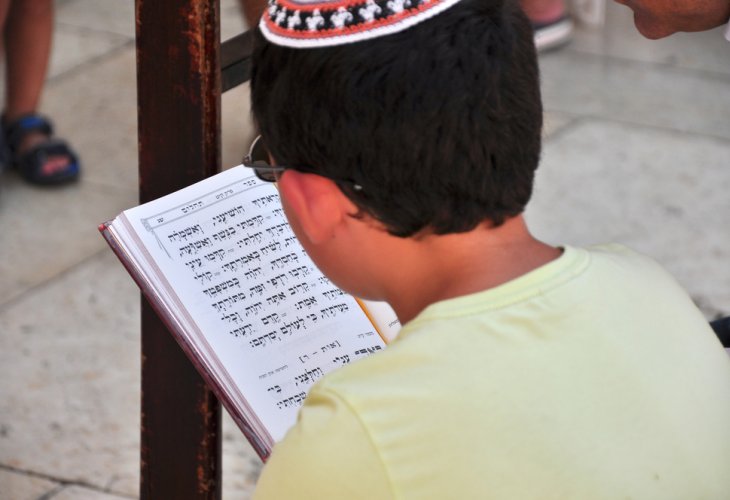Beginners Guide
How Did Book of Psalms Become the Most Read Book? 4 Facts About Its Powerful Impact
What makes the Book of Psalms so special, and why is it read more than any other book in the Bible?
 (Photo: shutterstock)
(Photo: shutterstock)Anyone living in an area with Torah-observant communities will know that Psalms (Tehillim) are an integral part of the landscape. At the health clinic while waiting for the doctor, on the bus ride, in the building courtyard as children play, and at the Western Wall and other holy sites, the nation of Israel is reciting Psalms. Whether during difficult times or in the corridors of the hospital, Jews, whether religious or secular, are seen with a Book of Psalms in hand. Have you ever wondered what's so special about this book? After all, the entire Bible was written by holy individuals endowed with prophetic spirit, so why the focus on Psalms specifically? What makes it such an inseparable part of the Jewish people's identity?
1. The psalms were all composed under divine inspiration—mostly by King David, but also by Moses, Abraham, the three sons of Korah, Adam, Asaf, Yeduthun, Heman, and Melchizedek. King David compiled these hymns into the Book of Psalms. The Zohar states, "Come and see, these songs and praises of David contain secrets and sublime insights within the secret wisdom, for they were all spoken through divine inspiration, and there was a blessed spirit on David when he sang them, thus they were spoken within the wisdom's secrets" (Parashat Vayishlach, page 179). Prayers written with divine inspiration contain sacred combinations that open heavenly gates. While it is advisable to also pray in one's own words like a child to a father, it would be wise not to forgo prayers written with divine inspiration where elevated secrets are embedded.
2. King David's prayers transcend time and are fitting for every occasion. Anyone can find a reflection of themselves in the chapters of Psalms and connect from their current place, as it is said in Midrash Tehillim, "Everything David said in his book is said both for himself and for all Israel and all times." Some chapters are pleas to Hashem for salvation and rescue, alongside words of faith and trust during dark times, while other chapters are expressions of praise, thanks, and recognition of the Creator of the world. Some chapters address times of spiritual downfall, seeking pardon and forgiveness from Hashem, while others express longing, yearning, and desire for divine closeness. The Psalms are essentially a conversation with Hashem in various situations we each encounter throughout our lives. By saying them, we reach out to Hashem with King David's sacred words alongside our personal feelings.
3. Rabbi Eliezer Isaac Papo wrote in his book 'Pele Yoetz' about the virtues of Psalms: "Regularly reading the Book of Psalms wards off all kinds of plagues and evil occurrences from oneself, one's household, one's family, and all the people of one's generation, and brings down all kinds of blessings, goodness, and success. It is received from holy individuals that anyone facing a time of distress or pain, or traveling by land or sea, should recite the entire Psalms daily with intent and humility, and they will witness wonders, and this is tried and tested."
In the anthology compiled by the Lubavitcher Rebbe known as 'Hayom Yom', the words of Rabbi Menachem Mendel Schneerson, the 'Tzemach Tzedek', are recorded: "The Tzemach Tzedek said: 'If only you knew the power of the verses of Psalms and their effect in the higher realms, you would recite them constantly. Know that the Psalms transcend all barriers, ascending higher and higher without any obstruction, and they lay themselves before the Master of the Universe, performing their actions with kindness and mercy.'" (From 'Hayom Yom', 24th of Shevat).
Rabbi Elimelech of Lizhensk, a Hasidic leader of the third generation, and a prominent disciple of the Maggid of Mezeritch, reveals: "Thus, the songs of King David are called Tehillim, capable of affecting everything, without the troubles of Satan or evil." (From 'Noam Elimelech', Likutei Shoshana).
Rabbi Abraham Twerski, known as 'the Maggid of Trisk', writes in 'Magen Avraham': "By sanctifying oneself and dedicating oneself to Hashem through the recitation of Psalms, the source of the divine blessing is awakened, empowering one to pray to Hashem to bestow all the good and blessings upon all Israel, both collectively and individually, spiritually and materially, life, sustenance, and healing."
4. The sages of Israel reveal great virtues in the recitation of Psalms, including protection from the evil inclination, the awakening of heavenly mercy and compassion, canceling accusations against a person, the abundance of success, longevity, opening of heavenly gates, and the bringing of blessings and good in both spiritual and material realms. The Malbim, a commentator on the Bible, writes that within the chapters of Psalms are precious and hidden virtues, remedies and potions, and keys to heavenly gates, in his words: "This book is the Holy of Holies, and this precious treasure, filled with holy splendor and all beautiful honor and might, contains all our cherished aspirations from the days of yore, while the spirit of song lived in the mouths of sacred hymns, while the spirit of Hashem fluttered upon the sweet singer of Israel over music and lyre, in His glorious palace. Every person will behold it, every prayer and every plea, every thanksgiving and every praise, for every matter and every detail, distress or salvation, trouble or ease, for individuals or multitudes, throughout life's changing tides and the stormy seasons of time pressing upon all who traverse the seas of life in its tumultuous waves and violent surges. There are also precious charms and hidden treasures from the secret of Hashem to His reverent ones, remedies and life-giving drugs, and keys to heavenly gates." (Malbim in his introduction to his commentary on the Book of Psalms).
The Weekly Challenge
Read 2 chapters of Psalms every morning.

